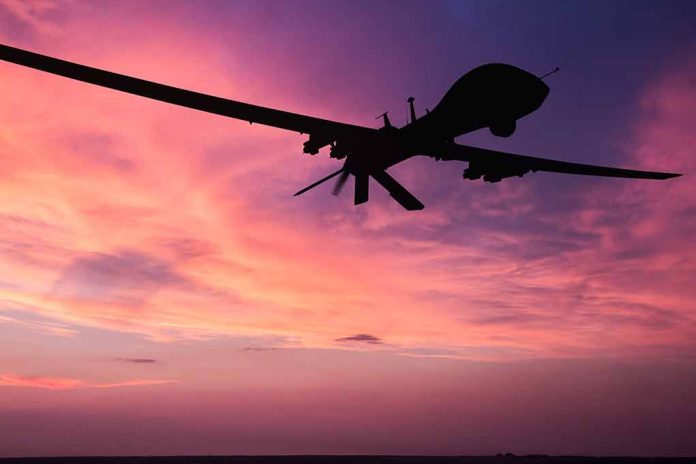
Rising tensions in the Middle East have been further inflamed following an Israeli drone strike that killed a prominent Jama’a Islamiya commander near Beirut’s outskirts, leaving regional stability teetering on the brink.
Key Takeaways
- Israel conducted an air strike in Beirut targeting senior Hezbollah commander Fuad Shukr.
- The strike caused damage to a block of flats in the Dahiyeh suburb, a Hezbollah stronghold.
- Conflicting reports exist about Shukr’s fate; Israel claims he was killed, while other sources say he survived.
- Lebanon’s Prime Minister criticized the strike as “blatant Israeli aggression.”
- The attack raises questions about potential escalation between Israel and Hezbollah.
Israeli Air Strike Target and Damage
An air strike conducted by Israeli forces in Beirut targeted the senior Hezbollah commander, Fuad Shukr. Reports indicate the operation damaged a block of flats in the Dahiyeh suburb, well-known as a Hezbollah stronghold. The ramifications of this operation on the Israeli-Hezbollah conflict remain a central point of concern.
Conflicting narratives about the air strike’s outcome are present. Israel has declared that the operation resulted in Shukr’s death, yet other sources contest this, suggesting the commander survived. Shukr’s involvement in prior attacks, notably one in the Golan Heights that claimed the lives of 12 children and young people, adds another layer to the complex conflict.
Regional and International Reactions
Lebanon’s Prime Minister Najib Mikati sharply criticized the Israeli air strike, labeling it as “blatant Israeli aggression.” The country’s official reaction sets the stage for rising regional tensions, a historical pattern observed in the enduring hostilities between Israel and Hezbollah.
The international community, including the United Nations, expressed concern over the strike. The UN Special Coordinator, Jeanine Hennis-Plasschaert, urged diplomatic solutions in lieu of ongoing aggression. Meanwhile, the United States, warned before the strike, has underscored Israel’s right to self-defense.
Future Implications and Broader Context
The Israeli drone strike raises questions about potential escalation with Hezbollah and broader implications for the ongoing Israel-Gaza conflict. Analysts and international observers keep a keen eye on these developments, understanding that these dynamics hold the power to shape future peacekeeping efforts in the turbulent region.
As tensions continue to mount, it remains crucial to monitor the situation. The looming potential for retaliation and further confrontations presents a volatile environment, making diplomatic solutions and international interventions paramount in maintaining a tenuous regional balance.


